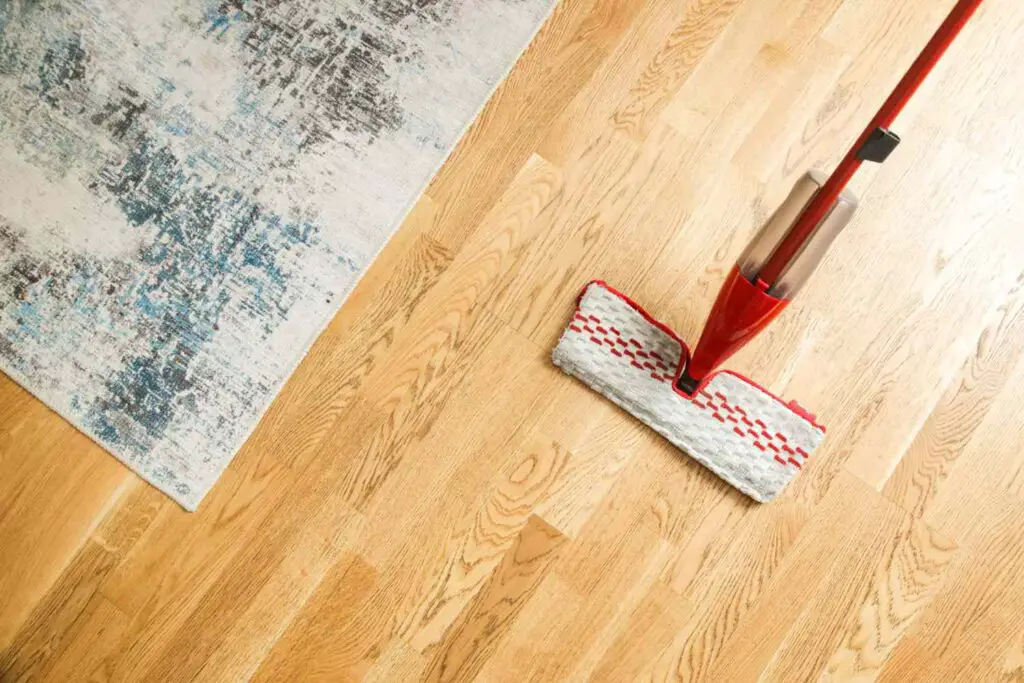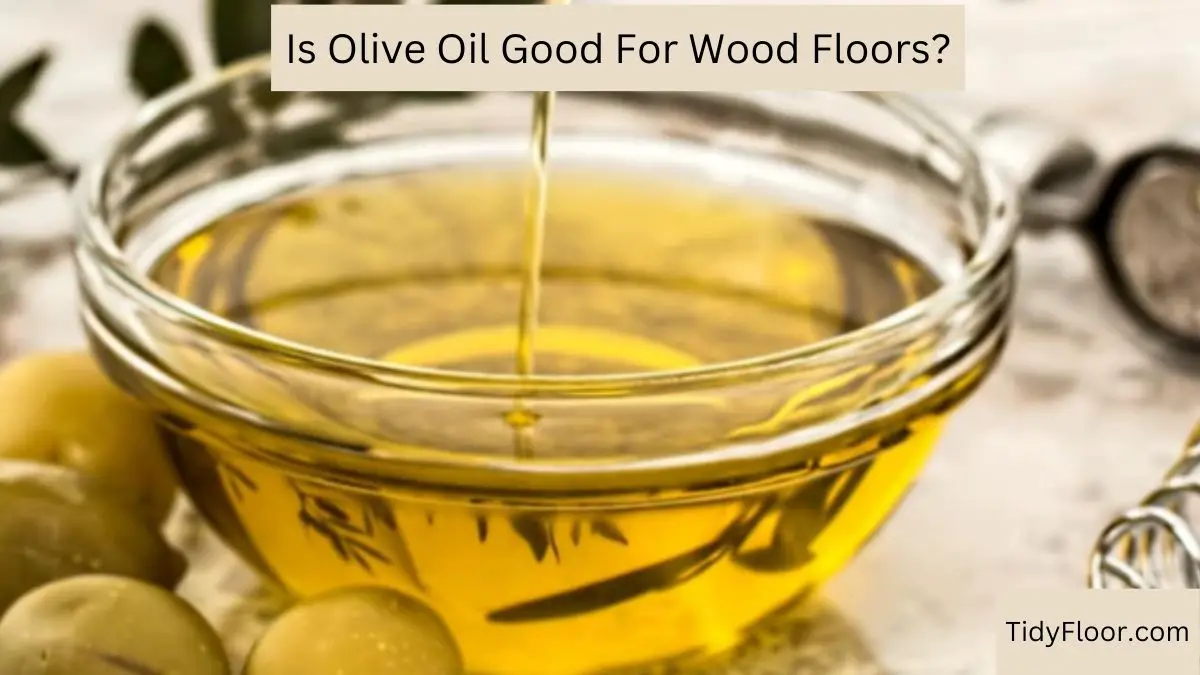If you’re looking to maintain and condition your wood floors, you have lots of options out there. Some oils like Tung oil, Danish oil, etc. are the best for wooden floors. But is olive oil good for wood floors or is it just a cooking staple?
Olive oil can add shine and nourish wood floors, but it’s essential to consider some things. Excessive use may lead to a greasy residue and potential slipperiness. Regular cleaning and proper application can help maintain the floors’ appearance and integrity.
Through this article, you are going to learn the benefits and drawbacks of using olive oil on wooden floors. Also, you’ll know how to make the best use of this oil.
Benefits Of Choose Olive Oil Good For Wood Floors

Opting for olive oil on your wood floors comes with its perks. From a natural moisturizer to adding a radiant shine, let’s explore the benefits that make choosing olive oil a compelling option for wood floor care.
Natural Moisturizer:
Olive oil serves as a natural moisturizer for wood floors by deeply penetrating the wood fibers, preventing them from drying out and maintaining their structural integrity. Its emollient properties help retain moisture, reducing the risk of cracks and splits, particularly in environments with low humidity. This natural hydration process revitalizes the wood, prolonging its lifespan and preserving its natural beauty.
Adds Shine:
Olive oil enhances the appearance of wood floors by adding a lustrous shine. When applied in moderation, it creates a glossy finish that highlights the wood’s natural color and grain patterns. This gives the floors a warm and inviting look. The shine imparted by olive oil can rejuvenate dull surfaces, making them appear refreshed and polished, without the need for harsh chemicals or synthetic additives.
Eco-Friendly Option:
Using olive oil for wood floors offers an eco-friendly alternative to commercial polishes that often contain harsh chemicals and additives. Olive oil is a natural and renewable resource, sourced from pressed olives. This makes it biodegradable and non-toxic. Using olive oil reduces your carbon footprint, while also contributing to a healthier indoor environment, free of harmful fumes and residues.
Cost-Effective:
Olive oil is a cost-effective option for polishing wood floors compared to purchasing specialized commercial polishes. It is readily available in most households and requires only a small amount for effective application. Maintaining the beauty and longevity of your wood floors can be achieved at a fraction of the cost by using olive oil.
Customizable Formulation:
You can easily customize olive oil-based wood floor polish by mixing it with other natural ingredients like vinegar or lemon juice to create a gentle cleaning solution tailored to your preferences.
How To Make The Best Use Of Olive Oil For Wood Floors:
Looking to make your wood floors shine with olive oil? Let’s dive into the best practices. From proper application techniques to maintenance tips, let’s ensure you get the most out of this natural wood treatment.
Use Sparingly:
Start with a small amount of olive oil and gradually add more as needed. Using too much can leave a greasy residue and make the floors slippery.
Mix with Vinegar:
To create a gentle wood floor cleaner, mix olive oil with white vinegar in a 1:1 ratio. The vinegar helps to clean the surface while the olive oil adds shine and moisturizes the wood.
Apply with a Cloth:
Dampen a soft, lint-free cloth with the olive oil mixture and use it to gently rub the oil onto the wood floors in a circular motion. Make sure to spread the oil evenly and avoid applying too much at once.
Buff Away Excess:
After applying the olive oil, use a clean cloth to buff away any excess oil and polish the wood to a shine. This helps to remove any remaining residue and prevents the floors from becoming slippery.
Protective Measures:
Consider using rugs or mats in high-traffic areas to protect the wood floors from wear and tear. Also, avoid dragging heavy furniture across the floors, as this can cause scratches and damage.
Drawbacks Of Using Olive Oil For Wood Floors:
Considering olive oil for your wood floors? Be cautious! While it offers shine and nourishment, there are drawbacks. Let’s explore potential pitfalls before you reach for that bottle.
Greasy Residue:
Using too much olive oil can leave behind a greasy residue on the surface of the wood, which can attract dust and dirt, making the floors look dirty.
Potential for Slipperiness:
Excessive use of olive oil can make wood floors slippery, posing a safety hazard, especially in high-traffic areas.
Not Long-Lasting:
The shine and moisturizing effects of olive oil may not last as long as commercial wood floor polishes, requiring more frequent reapplication.
Related Questions:
Can Olive Oil Be Used On All Types Of Wood Floors?
Olive oil can generally be used on most types of wood floors, including hardwood, engineered wood, and laminate. However, it’s essential to consider the specific characteristics of your wood floors before applying olive oil. Hardwood floors typically respond well to olive oil treatments. However, engineered wood and laminate floors may not absorb the oil as effectively due to their protective coatings.
Also, some wood finishes may react differently to olive oil. So it’s advisable to test it in a small, inconspicuous area first to ensure compatibility and desired results.
Are There Any Long-term Effects Of Using Olive Oil On Wood Floors?
Using olive oil on wood floors can have both short-term and long-term effects. While it can provide immediate shine and moisturization, long-term use may lead to issues such as residue buildup, which attracts dust and dirt, causing the floors to look dull over time.
Further, repeated application of olive oil may result in a greasy film that is difficult to remove and can affect the wood’s natural appearance. Regular maintenance and proper application techniques can help mitigate these long-term effects and preserve the beauty and integrity of the wood floors.
How Does Olive Oil Compare To Other Commercial Wood Treatments?
Olive oil offers a natural and eco-friendly alternative to many commercial wood treatments. Unlike some commercial products that contain harsh chemicals or synthetic additives, olive oil is biodegradable and non-toxic, making it safer for both indoor use and the environment.
In contrast to specialized wood treatments, olive oil may not offer the same level of durability or long-term protection against scratches, moisture, and UV damage. Commercial treatments often contain additives designed to enhance durability and resistance, making them better suited for high-traffic areas or outdoor use, where olive oil alone may not suffice.
What Steps Can Be Taken To Prevent The Attraction Of Dust And Dirt When Using Olive Oil On Wood Floors?
To prevent the attraction of dust and dirt when using olive oil on wood floors, ensure proper application and thorough buffing to remove excess oil. Use a lint-free cloth to apply the oil in thin, even layers, and buff the surface afterward to remove any residue.
Also, regular cleaning with a dry mop or vacuum can help prevent dust buildup, while placing rugs or mats in high-traffic areas can minimize the amount of dirt tracked onto the floors.
Can You Use Olive Oil On Unfinished Wood?
Can Olive Oil Be Used On All Types Of Wood Floors?
Olive oil can generally be used on most types of wood floors, including hardwood, engineered wood, and laminate. However, it’s essential to consider the specific characteristics of your wood floors before applying olive oil. Hardwood floors typically respond well to olive oil treatments. However, engineered wood and laminate floors may not absorb the oil as effectively due to their protective coatings.
Also, some wood finishes may react differently to olive oil. So it’s advisable to test it in a small, inconspicuous area first to ensure compatibility and desired results.
Are There Any Long-term Effects Of Using Olive Oil On Wood Floors?
Using olive oil on wood floors can have both short-term and long-term effects. While it can provide immediate shine and moisturization, long-term use may lead to issues such as residue buildup, which attracts dust and dirt, causing the floors to look dull over time.
Further, repeated application of olive oil may result in a greasy film that is difficult to remove and can affect the wood’s natural appearance. Regular maintenance and proper application techniques can help mitigate these long-term effects and preserve the beauty and integrity of the wood floors.
How Does Olive Oil Compare To Other Commercial Wood Treatments?
Olive oil offers a natural and eco-friendly alternative to many commercial wood treatments. Unlike some commercial products that contain harsh chemicals or synthetic additives, olive oil is biodegradable and non-toxic, making it safer for both indoor use and the environment.
In contrast to specialized wood treatments, olive oil may not offer the same level of durability or long-term protection against scratches, moisture, and UV damage. Commercial treatments often contain additives designed to enhance durability and resistance, making them better suited for high-traffic areas or outdoor use, where olive oil alone may not suffice.
What Steps Can Be Taken To Prevent The Attraction Of Dust And Dirt When Using Olive Oil On Wood Floors?
To prevent the attraction of dust and dirt when using olive oil on wood floors, ensure proper application and thorough buffing to remove excess oil. Use a lint-free cloth to apply the oil in thin, even layers, and buff the surface afterward to remove any residue.
Also, regular cleaning with a dry mop or vacuum can help prevent dust buildup, while placing rugs or mats in high-traffic areas can minimize the amount of dirt tracked onto the floors.
Conclusion:
olive oil can be a natural option for enhancing the appearance of wood floors. It’s crucial to use it judiciously and be mindful of potential drawbacks. With proper application and regular maintenance, olive oil can contribute to a beautiful and well-maintained wood floor, adding a touch of natural elegance to any space. Hope, you now know if is olive oil good for wood floors or not.


